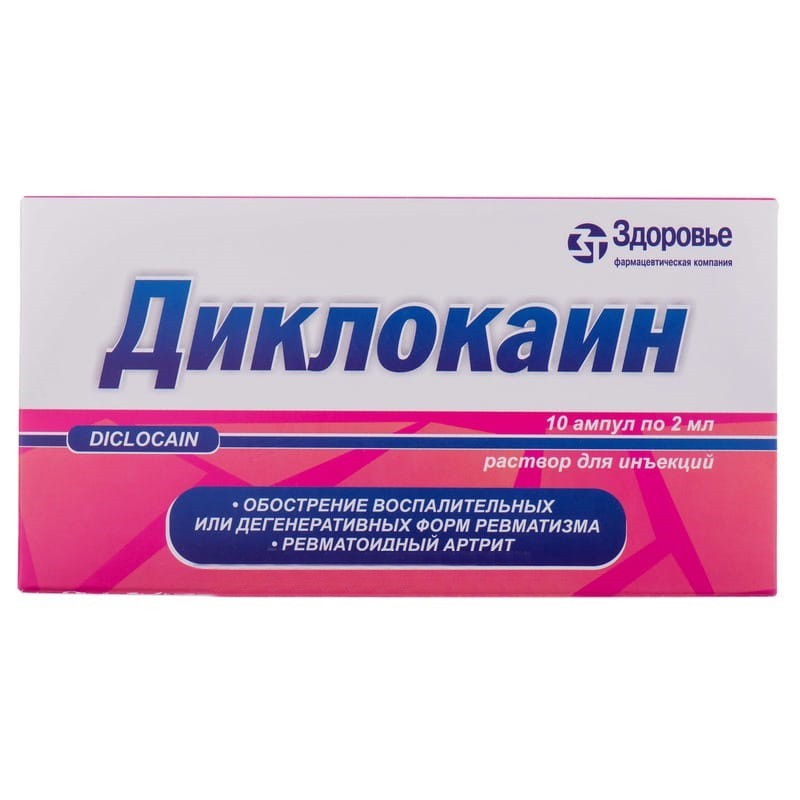



 Secure and encrypted payment processing
Secure and encrypted payment processing We ship to over 40 countries including the USA, UK, Europe, Australia and Japan
We ship to over 40 countries including the USA, UK, Europe, Australia and Japan Guaranteed refund or reship if you haven't received your order
Guaranteed refund or reship if you haven't received your orderDiclocaine has a pronounced anti-inflammatory, analgesic, antipyretic and antiplatelet effect, due to inhibition of the biosynthesis of prostaglandins and other mediators of inflammation and pain, a decrease in capillary permeability and a stabilizing effect on lysosomal membranes. slows down the formation of proteoglycan in cartilage. lidocaine, which is part of the drug, relieves pain at the injection site. with rheumatic diseases, the anti-inflammatory and analgesic properties of the drug reduce the severity of symptoms such as pain at rest and during movement, morning stiffness, swelling of the joints. It has a pronounced analgesic effect with moderate and severe pain syndrome of a non-rheumatic nature. with inflammatory processes that occur after operations and injuries, it quickly reduces both spontaneous pain, and arising from movement, inflammatory swelling of the wound.
With i / m use, diclofenac is rapidly and completely absorbed. The maximum concentration in blood serum (1.5 μg / ml) with i / m administration is achieved after 10-30 minutes. The concentration in the blood serum is linearly dependent on the dose of the drug. Biotransformation occurs as a result of repeated or single hydroxylation or conjugation with glucuronic acid. 60% of diclofenac is excreted as metabolites through the kidneys; less than 1% - unchanged, the rest - in the form of metabolites with bile.
As an analgesic, anti-inflammatory and antipyretic agent in the acute period with rheumatoid arthritis, ankylosing spondylitis, acute gouty, infectious, psoriatic and traumatic arthritis, osteoarthritis, bursitis, tendovaginitis, radiculitis, thrombophlengitis, neuralgia colchitis, neuralgia colchitis, neuralgia colchitis, neuralgia colchitis, neuralgia colchitis, neuralgia colchitis, neuralgia colitis, neuralgia colitis accompanied by inflammation, pain and fever.
Intramuscularly (deep into the gluteal muscle) is administered 2 ml 1-2 times a day. the course of treatment is 3-5 days, after which you should switch to the use of diclofenac in the form of tablets or suppositories. injections of diclocaine can be combined with taking diclofenac tablets, while its total daily dose should not exceed 150 mg.
Peptic ulcer of the stomach and duodenum, ba, hematopoiesis, hypersensitivity to diclofenac or lidocaine, during pregnancy or lactation.
In some patients, nausea, belching, discomfort in the epigastric region, dizziness, headache, allergic reactions are possible. these phenomena usually disappear on their own and drug withdrawal is not required. other side effects characteristic of NSAIDs (impaired liver and kidney function, impaired hematopoiesis) are extremely rare with diclocaine treatment.
For patients with a history of allergic reactions to NSAIDs, diclocaine is prescribed only as an emergency. with caution prescribed for diseases of the liver, kidneys, digestive tract in the anamnesis, with arrhythmias, heart failure, as well as the elderly. during treatment, systematic monitoring of the functional state of the liver, kidneys, and peripheral blood composition is recommended.
In connection with the important role of prostaglandins in supporting renal blood flow, special care should be taken when prescribing the drug to patients with heart or kidney failure, as well as elderly people taking diuretics, and with reduced BCC (for example, after extensive surgery). If diclocaine is prescribed in such cases, it is recommended to monitor renal function.With prolonged use of the drug, it is necessary to monitor liver function, the composition of peripheral blood.
During the treatment period, a decrease in the speed of mental and motor reactions is possible.
There is no experience with the use of the drug in pediatrics.
Diclocaine can weaken the effect of thiazide and loop diuretics, increase the concentration of digoxin, lithium and cyclosporin in the blood serum. against the background of the use of potassium-sparing diuretics, the risk of developing hyperkalemia increases, anticoagulants - the risk of bleeding. when combined with anticoagulants, control of the anticoagulant effect is necessary. reduces the effect of diuretic, antihypertensive and hypnotics. increases the likelihood of side effects of NSAIDs and corticosteroids (gastrointestinal bleeding), the toxicity of methotrexate and nephrotoxicity of cyclosporine. acetylsalicylic acid reduces the concentration of diclofenac in blood plasma. with simultaneous use with antidiabetic drugs, both hypo- and hyperglycemia are possible.
Dizziness, headache, hyperventilation of the lungs, confusion, nausea, vomiting, abdominal pain. symptomatic treatment.
In the dark place at a temperature of 15-25 ° C.